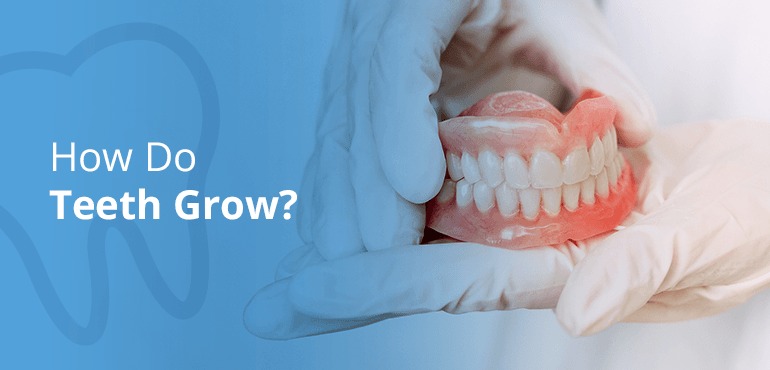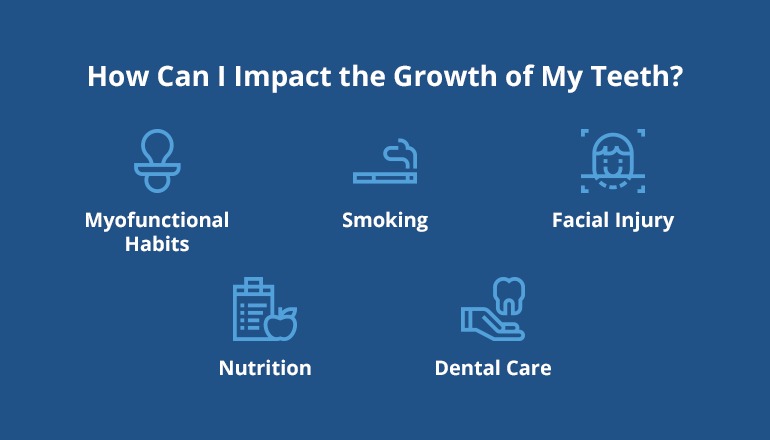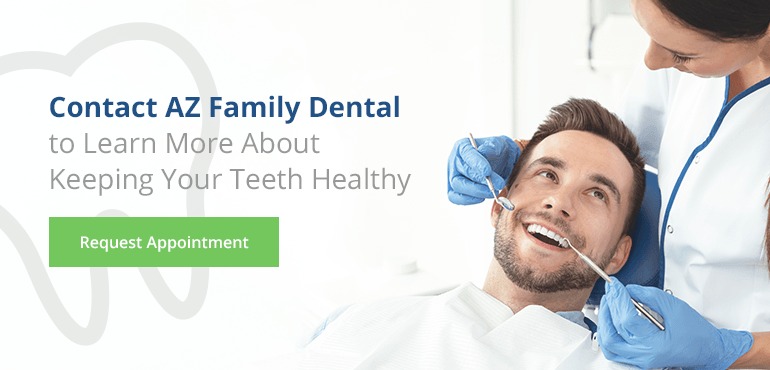
We all have them and use them every day, but where do teeth come from? How do teeth grow through gums? And what makes up teeth? Learning more about how our teeth develop and what they consist of can help us take better care of them in our day-to-day lives.
To help you preserve your teeth’s health, this article will answer all your tooth growth questions from “How do teeth grow in your mouth?” to “How do teeth grow back?” Keep reading if you’ve ever wanted to know more about what goes on in your mouth.
Although our teeth and bones contain more than 99% of our body’s calcium, teeth are not bone. Despite their similarities, bone is living tissue, whereas teeth are not. Without any living tissue, the outermost layer of your teeth is even harder than bone. Indeed, this layer — known as enamel — is the hardest substance in your entire body.
So if your teeth aren’t bone, what are they? There are four different types of tissue within a tooth — enamel, dentin, cementum, and pulp. Unlike bone, these tissues are not living.
Check out the functions of these four tissues.
Now that you know what teeth consist of, let’s look at how they develop and change over your lifetime.
Teeth first start to develop while a baby is still in the womb, which is why the mother’s diet should include plenty of calcium and vitamin D. Around six weeks into a pregnancy, the basic substance of the teeth begins to form. At about three or four months of pregnancy, the hard tissue that surrounds teeth forms.
After a baby’s birth, teeth slowly begin to start protruding through the gumline. Although every child is different, a baby’s teeth usually start to come in around 6 months. The first tooth to grow through gums is typically a lower, middle front tooth.
During these early years, teeth continue to erupt, with the back molars being the last teeth to come in. In general, a child’s complete set of 20 primary teeth has fully come in by the time they are 3. Though these baby teeth will eventually fall out, it’s still crucial to practice good dental hygiene to prevent severe decay and spacing problems for adult teeth.
Around 6 years, a child will begin to lose their primary set of teeth so the secondary set of teeth can grow back in its place. After the child loses their first few baby teeth, the first permanent molars will begin to erupt. Children typically lose their last baby tooth at around 12 years, leaving them with 28 permanent adult teeth.
During the teenage to young adult years, four final teeth will begin to come in. These four teeth are the third set of molars, commonly referred to as wisdom teeth. After these molars come in, there will be 32 adult teeth by around age 21. Often, wisdom teeth can become impacted or cause overcrowding and need surgical removal. In other cases, wisdom teeth might never develop.
Throughout the adult years, follow proper oral hygiene to keep your permanent teeth healthy. If you lose or damage a tooth, the only option is an artificial tooth replacement, because adult teeth do not grow back. Following a daily oral hygiene routine and a healthy diet will protect adult teeth from decay.
Even the most avid tooth brusher’s teeth become more vulnerable to damage with age. As the years go by, the gums become more likely to recede or develop gum disease, especially for those who smoke or drink. However, keeping up with a daily brushing and flossing regimen can help avoid dental corrections like crowns, dental implants, or dentures.

Much of the way teeth grow in is due to genetics and heredity, such as your natural jaw size and whether the jaw has any misalignment. Though some factors are out of your control, additional elements can affect the growth of your teeth. Here are the ways you may impact your teeth’s growth.
Myofunctional habits are repeated behaviors that can permanently affect the muscles or functions of the face and mouth. These types of habits include the following.
Smoking can result in . Even those who live with regular exposure to secondhand smoke can become more likely to develop cavities. Keep your home and car smoke-free to create a healthy environment for your teeth and others.
A hit to the mouth or face can cause trauma to teeth or knock them out of place, resulting in some missing or crooked teeth. Losing baby teeth too soon can lead to permanent teeth growing in slanted instead of straight. Although accidents are unavoidable, you can reduce the risk by never walking or running with anything in your mouth and wearing a mouthguard during contact sports.
Proper nutrition is vital to healthy dental development, especially in children. Poor nutrition can lead to tooth decay and potentially crooked teeth, so it’s essential to follow a healthy diet. Try to limit your intake of sugary snacks, juice, and sticky foods, such as caramel and dried fruit.
Of course, proper dental care is the foundation of good tooth growth. Brushing your teeth and flossing twice per day, along with regular dental checkups, can help prevent or treat dental problems like cavities or gum disease. Make sure you stay on top of your dental routine to help your teeth develop correctly.

Now that you know what teeth consist of and how they grow, you can have a better idea of how to take care of them. To begin making your personalized dental plan, contact AZ Family Dental. At AZ Family Dental, we offer a full continuum of dental care — from routine cleanings to wisdom tooth removal — and treat each of our patients like family members.
If you’re looking for quality dental care at a fair price in Glendale, AZ, schedule an appointment with AZ Family Dental today!